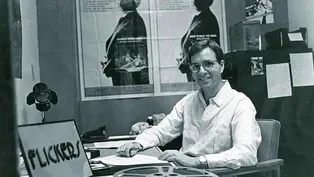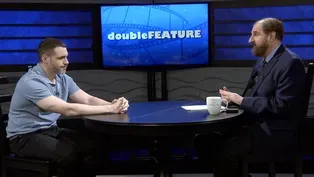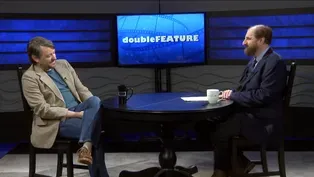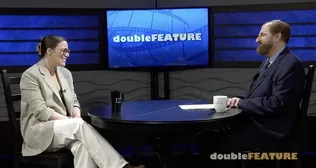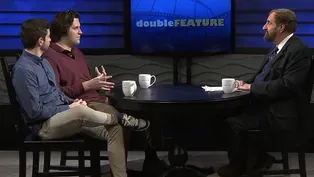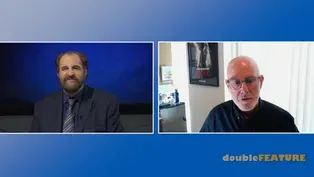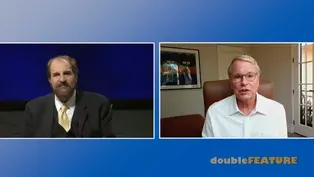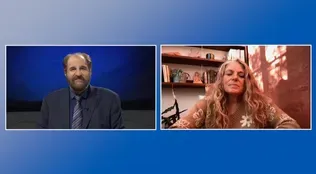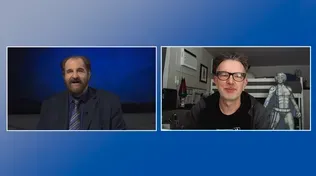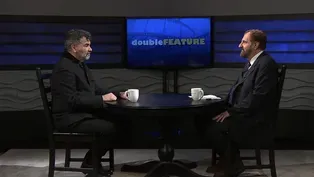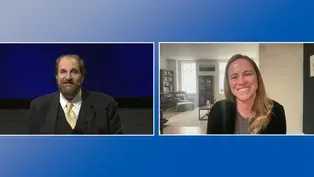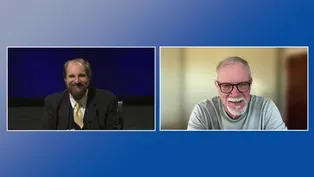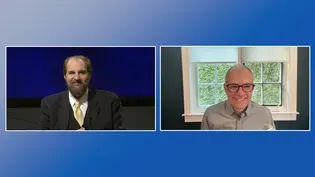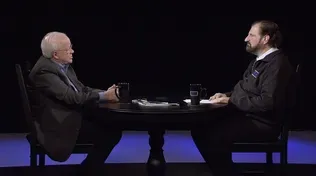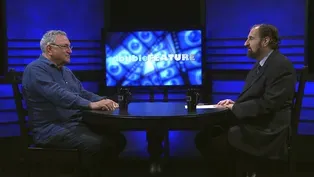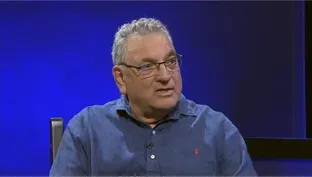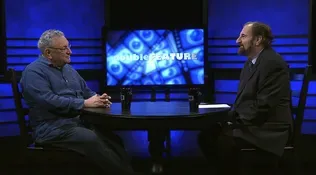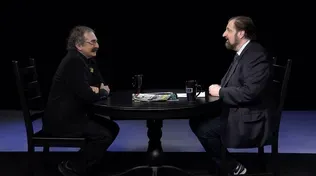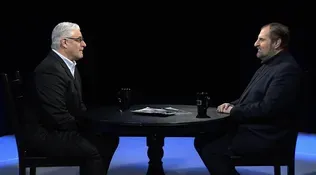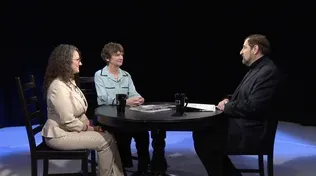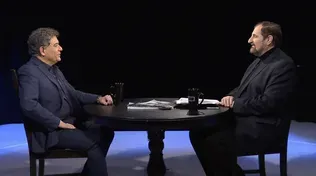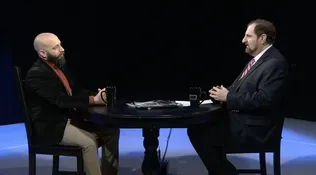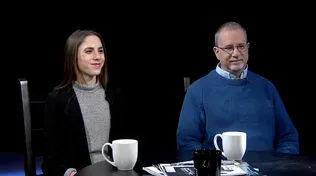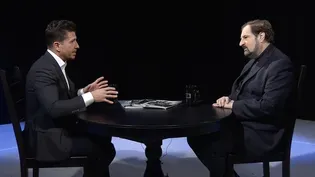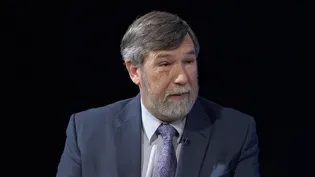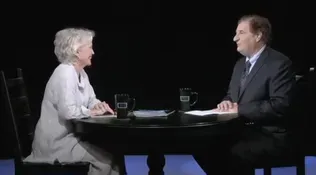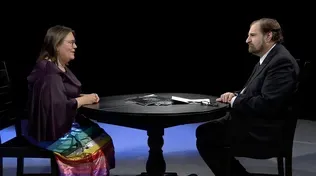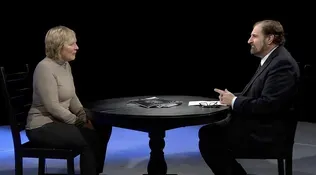
Interview with David Crocket
Clip | 45m 29sVideo has Closed Captions
Steven Feinberg interviews producer David Crockett.
Steven Feinberg, executive director of The Rhode Island Film and TV Office, interviews producer David Crocket, who is best known for his work on HBO's "The Gilded Age," Martin Scorsese's "Hugo," "Gone Baby Gone," and "The Town."
Problems with Closed Captions? Closed Captioning Feedback
Problems with Closed Captions? Closed Captioning Feedback
doubleFEATURE is a local public television program presented by Rhode Island PBS

Interview with David Crocket
Clip | 45m 29sVideo has Closed Captions
Steven Feinberg, executive director of The Rhode Island Film and TV Office, interviews producer David Crocket, who is best known for his work on HBO's "The Gilded Age," Martin Scorsese's "Hugo," "Gone Baby Gone," and "The Town."
Problems with Closed Captions? Closed Captioning Feedback
How to Watch doubleFEATURE
doubleFEATURE is available to stream on pbs.org and the free PBS App, available on iPhone, Apple TV, Android TV, Android smartphones, Amazon Fire TV, Amazon Fire Tablet, Roku, Samsung Smart TV, and Vizio.
- Hi, I'm Steven Feinberg, executive director of the Rhode Island Film and Television Office.
Tonight we have an amazing guest.
He's been the producer of shows like "Gone Baby Gone," "The Town," and most recently, the Emmy Award-winning HBO Max Series, "The Gilded Age."
David Crocket, welcome to "Double Feature."
- Thanks for having me, Steven.
- So, you're in Los Angeles right now.
I know you just finished season two of "The Gilded Age," which was created by Julian Fellowes of "Downton Abbey" fame.
and we loved having you here in Rhode Island and Newport for season one.
And we were here when you were filming season two.
Are you happy with season two?
- Oh, we're really excited.
You know, it comes out now in a couple weeks or less.
It is, you get some of the bugs of the first season out, you've introduced all your characters.
And we have a lot of characters, and you get that rolling.
And now you come into season two, and you can just jump right in to, you know, great stories, because the audience knows these characters.
And so we're really excited, and we think, we think it really delivers on a lot of levels, and that people will, you know, really enjoy it.
- You know what's neat, when we originally discussed bringing "The Gilded Age," you know, to Rhode Island, to Newport, and obviously we had discussed the scripts and all, and we knew who the characters were, but the audience didn't know who Bertha Russell was.
But now, if I say, "Oh, there's Bertha Russell," everybody's head's gonna spin around.
People love the characters, they love the Russells.
- They're just, they're just a great, they're, you know, they're a great power couple of their, of their time.
And they were, they were sort of emblematic of a couple of the time.
But they're also very unique in that they really, you know, they really support each other.
They are really a team.
They work together.
You know, Bertha and George are just, you know, they're fun to watch.
I think in this season, they have a few, a few hiccups.
You know, every relationship over time has its challenges, and they have a few challenges that we'll see.
But, you know, I think we all have an underlying understanding and a sense that they're gonna, you know, they're in it for the long haul.
- If you had to give a synopsis of what "The Gilded Age" the series is, for those who maybe haven't seen it, could you provide that for our audience?
- Well, I think it's, you know, it's a show that really is you know, it's in the vein on "Downton Abbey" in a way of, there's a large cast of characters, it's upstairs, downstairs.
But our show, differing from that show, is of really a America at a, at its sort of, you know, at the dawn of the industrial age, obviously "The Gilded Age."
And it's the beginning of this whole system of this American financial system.
The world is really taking off at this time.
It's post-Civil War, and we have, you know, a large cast of characters, two families who live across the street, one old money, one new money, which is a story that you could set in many eras.
Which is, you know, there's one family that's sort of set in their ways.
There's a new family who's coming in.
They've got these new ways, and with new money, and it's kind of the battle between them, or the challenge of them being neighbors, and really trying to get along and move forward in the world.
And amongst that, we have a cast of characters of, you know, that's close to 30.
And we touch on a lot of different aspects of life during that period.
- And the show takes place in New York.
And then the Summer cottages were then called Summer Cottages of Newport, Rhode Island.
I know that we, here in Rhode Island have been so excited, A, that the Preservation Society of Newport really has made sure that these mansions, these authentic museums have been preserved, restored.
I think they spent about $7 million recently just upgrading and making sure everything at Rosecliffe is up to its full potential.
And as they were actually restoring, like some of the front doors, they found some more gilded frontage on the front doors.
Has that helped the production to have the authenticity of the locations here in Newport?
- The short answer is "yes," incredibly.
You know, the show is set in New York, primarily on a fictional 61st street, right along the park there, Central Park, two houses right across the street from each other.
But, and again, these are, are families with means at that time.
One of them is a, is a robber baron, George Russell, Bertha Russell is his wife.
What those, that set did, what Society did during the summer during that period, was they went to Newport, and they went to the Newport Cottages.
So that was always part of the story that Julian wanted to tell.
What we came to find, once we actually started to get into it, and we visited you, and we visited the Preservation Society cottages, I would call them grand mansions.
Once we, once we visited, it really became evident that we not only wanted to place more of the story there, but there was always going to be an element of the actual story set in Newport, Rhode Island, because that, again, is, it's true to the, to the period.
But then we learned that we could, you know, use these mansions, use it a room in this, in the mansion, use our biggest, most running set, long running set that we use consistently, is we use the kitchen at the Elms.
- And the kitchen at the Elms is the kitchen of the Russell House in New York.
So that's a set that we revisit virtually in every episode.
So we have come to shoot the Tennis Hall of Fame, we've shot Belcourt, we've shot... And again, countless, well, I wouldn't say countless, I would say five or six, no, six or seven of the Newport Preservation Society mansions, we have filmed in over the years.
And I can't even imagine making the show without that resource, without their support.
- What I thought was really neat, I don't think you guys had been to the Tennis Hall of Fame.
I think we actually had you visit, it was, it was in the winter.
It was just a snowstorm.
- That's true.
I remember.
Yeah.
- But I said, you gotta check out the, the Newport Hall of Fame, of which you guys did an amazing recreation of the time period to the point, and the audiences, I don't, I'm sure they will not see this or appreciate it, but the fact that you made the netting appropriate for the time period, that kind of authenticity is amazing.
And again, that might not be, an average viewer's not gonna notice that, but those folks who are in the world of art directors and production designers are going to see that detail was so important.
And it's a spectacular show.
- If you look closely at the, there's a chair umpire, and there is a ball person.
I think it was a man, I'm trying to remember.
But there's a, I remember the outfit more because we had to kind of approve it in advance.
And, you know, they had, it was just the level of detail like you're saying, the way it was designed and crafted, you just believe that it's real.
You know that it's real because it's so different from what we see today.
So yeah, they do an amazing job.
- How would you, how would you define the two seasons?
So season one, you've established these characters, and by the way, you guys did a groundbreaking job with the African American experience, which I think enlightened a lot of us.
But how does season two progress as far as, is there, is there a different vibe to season two than maybe season one?
Are there certain things that might be surprising for us that you can share?
- Sure.
Season one was sort of an introduction to the world.
It was Marian Brook, played by Louisa Jacobson, had just arrived into, or just arrived in episode one into the city.
And we see a lot of things through her eyes.
And it becomes between Christine Baranski's character, and, of Agnes, and who, let me be clearer here.
Louisa Jacobson comes, Marian Brook comes to town to stay with her aunts.
Her aunts is Agnes Van Ryan and Ada Brook.
Agnes is the head of that household.
Christine Baranski, she becomes the principal rival, and Christine is the old money.
She becomes the principal rival of Carrie Coon, who played, who plays Bertha Russell across the street.
So that, the whole first season is really sort of that introduction to the world.
And then it's a battle of old money versus new money, basically in, again, there are many, many stories going on, but Bertha Russell wants to host a party at her house, and wants to have people come.
She's the new money.
Nobody wants to touch her.
So so that is sort of the framework of the season.
And then throughout that, we meet and do so many things.
At the end of that season, she has some success.
She sort of uses every available asset she has, bribes, cajoles, tricks people into coming to this party.
They come to the party.
It's a wild success.
She's part of society.
- Right.
- Season two, now she's in society, and it is her basically trying to ascend to the head of society and sort of supplant Mrs. Astor, or at least become at a minimum, becoming equal.
- It is power struggle.
- And that is the framework of the, there's opera wars.
And the two rival opera houses are opening on the same day in 1883.
True story.
So Mrs. Astor is with the old money.
Carrie Coon is representing the new money.
And throughout the season, they go back and forth and see who's going to- - This power struggle.
This amazing power struggle.
- It's a power struggle.
- And that's the other thing.
You brought up, and I thought it was really neat that you brought it up, and I know Julian does a lot of homework.
But you guys, through your research, find out what is happening during that time period, and you can use that as, you know, as a, I guess, like a journey, by using these true stories and true experiences like you did in season one with the lighting up in New York City with the electricity.
And that was a beautiful sequence.
So you're able to follow some of those true stories, incidents to help pave the way for the show itself and the characters that we have.
- I think that's, that's, just, you know, what Julian does.
That is part of his writing that is, you know, he did that in "Downton," he's done that in other shows, and he does that here.
What the great thing about, I mean, we have a team of researchers working on different aspects of the show.
And what is so great about it is we consistently, even as recently as two or three weeks ago, thinking ahead, you know, should we be fortunate enough for a season three, two or three weeks ago, something came across my desk, from, you know, now I'm on every feed that has to do with American history.
And you find these interesting things, you do a little deeper dive, you talk to a researcher, and then you talk to Julian and say, "Hey, maybe Marian could do this, or maybe Peggy could do that."
So there's just, it's such a great wealth of information for us, and it's really fun.
I mean, you get to pick and choose sort of some of the best stories of the period for, you know, one of your 30 characters.
- And these are people that you really care about.
Let me, let's, let's go back in your personal career.
So you're the producer, correct, of the "Gilded Age," that's your title, right?
Producer?
- It's and executive producer.
- Executive producer.
Okay.
But you started out, well, I don't know about starting out, but you've been a co-producer on movies like "Bad Santa," you've done "The Great Debaters" with Denzel Washington, "Hugo" with Martin Scorsese.
You've worked with Ben Affleck several times.
How did you get started in the film industry?
- You know, it's, I was work, I graduated from the University of Illinois and I lived in Chicago.
I lived, I stayed with my parents for a couple months after graduation, then moved into the city.
I was looking for jobs, and found one at a commercial production company.
Early 90's, the industry in Chicago, there was a lot of commercial production out there.
- Was that an interest of yours right, as a child, or young, "I wanna get involved in the creative economy, film, or TV, or production?"
- It was, it was, yes, it was.
However, it was, you know, coming from sort of, you know, a modest, you know, middle class, middle, you know, Midwest background.
You just don't know about those sort of jobs.
You don't know about those opportunities.
And my parents were always, you know, pretty open and pretty supportive.
You know, as long as you supported yourself, so to speak.
So that my dad said, "Well, give it a try, you know, there's a lot of commercial production.
Give it a try, see if you can get involved in production.
See what that world is about."
At the meantime, I was working at my aunt's restaurant, you know.
- Paying the bills.
- Every, you know, in the evenings.
- Yep.
- And so I worked at a commercial production company, being a production assistant, doing every errand, whatever, for about, I don't know, six, eight months.
And then when movies would come to town, Chicago was a fairly popular production hub at the time.
- What year was this about?
- This was about 1993.
- Okay.
- So, and then I would try to work on these films.
And eventually I kind of, you know, got a little bit lucky.
I posed as a reporter to call this one, call one production office.
And they gave me the information of the production manager.
I got ahold of the production manager.
And I, and they just happened to be looking for an assistant accountant, which was really just a PA in the accounting department.
But I had a business, undergraduate business, and from the University of Illinois, and as well as communications and film.
So they said, "Well, hey, well maybe you could do it."
So it was a Michael Apted movie called "Blink."
- Oh, right.
- Starring Aiden Quinn and Madeline Stowe.
- Yes.
- And I worked in that office, and right after that...
It is about getting your foot in the door.
The production accountant said, "Well, I have this other movie..." Or "I know somebody, a friend of mine has this other movie in Los Angeles.
Do you, you know, do you wanna come out there?"
And I said, "Sure.
That was always part of my plan."
It was never part of my plan.
- Right.
Right.
- I was just, you know, I was just living, you know, month to month, figuring it out.
- Right.
- And I moved out, and that next movie was "The Mask," starring Jim Carrey.
- Oh- - So I was, again, I was an assistant production accountant.
There's no glamour or glitz in that.
But then I started to learn about the business and what I wanted to do.
And now that I had a foot in the door, I could start to set myself- - You made yourself useful, right?
- It's simple, well put.
Well put.
- I try to tell people.
"Well how do I..." Make yourself useful.
Find ways to make yourself useful.
- That is a hundred percent true.
- Be a good team player, be responsible.
Be on time.
And be happy.
Nobody wants to go into a battle with someone who's complaining and all, and just someone who's enthusiastic.
And obviously, when someone suggests that they're, they've got a friend who's got another movie, that means that they respect you, like you, know that if they're going to suggest you for another show, you're not going to embarrass them.
You're gonna make them look good.
Right?
- No, I tell, you know, I talk to a lot of young people.
I have kids.
I have one, a daughter who just graduated from university.
And I tell other kids who I meet, or young people, it's, you know, every industry, every business, you know, they need good people.
They need good people.
They need people who are eager and who want to work, and who want to do things.
And so if you just, you know, you stay in the game long enough and you work hard enough.
And again, you know, the business now is different.
And it's not easy.
I'm not saying, especially this one.
But nonetheless, we always are looking for a good one of that, or, you know, or of this.
So it just, it's out there.
- Yeah.
You're looking for good teammates, right?
And just- - Correct.
- Folks who are- - People you wanna be around, people who- - Are pleasant.
- Like-minded people, similar goals to make good stuff, and work on good stuff, and work with good people, et cetera.
- Right, right.
So what was it like, what's it like?
Obviously you work with Michael Apted who is a great director.
Did you get to spend any time with him?
He ended up- - Not then.
I actually ran into him years later at a, I believe it was a DGA event.
He was the president of DGA for a while.
I ran into him and I actually made a point to go up to him, and I said, "I'm sure you don't remember me."
- (laughing) Right.
- But- - "You like your coffee hot."
- Exactly, exactly.
But he had, we had a good laugh, and he was such a gentleman.
And yeah, no, it was that.
So it was years later that, you know, it wasn't until years later, perhaps the first director I remember working with, or talking to as a, you know, not as a colleague, he was far my, you know, superior, or my boss, but somebody I could talk to was Wes Craven who was a great man.
- Oh, right.
- Directed a lot of movies- - Horror movies.
- "Nightmare on Elm Street" being his first big one.
But then I worked with him on a few movies, and the first one being "Scream."
- Oh, yeah.
- The first "Scream" with Drew Barrymore, Courtney Cox, et cetera.
- What was your, what was your position on "Scream?"
- I was the production accountant, actually.
- Okay.
- So that was about five years after this other thing, or after the stories I've just told.
I kind of moved up quickly.
And again, it was a changing time in the industry, so they were like, "That guy, we'll take him."
- "He's responsible for our money."
- Exactly.
Exactly.
So I did that, and I got to know Wes.
But you were just talking about directors.
So that was the first director who I had a relationship with.
And what a lovely man.
- I've heard so many nice things about him.
A few of my friends had developed some projects with him, and they would rave at what a nice guy he was.
- I also saw him years ago.
He's passed now.
- Right.
- But I saw him years ago.
Maybe not even that many.
Call it 10 or 12, on "Martha's Vineyard."
He spent a lot of time in your neck of the woods.
Not your state, but your neck of the woods.
And so he enjoyed your New England.
- Now let me ask you something.
How did you get involved in "Hugo," the beautiful award-winning movie?
Martin Scorsese directed that.
How did that all come about?
How did David Crocket become a producer on that?
- I was working at, I had done "The Town."
Graham King, who was a producer and financier, part financier of "The Town," along with Warner Brothers, excuse me.
He was starting a small production company, had some financing, and had this little movie.
It was not a little movie, it was a massive movie.
- (laughing) Right.
- Called, "Hugo."
And I was coming in to run production, to develop some new projects, to, you know, kind of, it was a small company.
So it was, you know, jack of all trades, come in, you know, be one of the three or four people at the top of this company and let's figure stuff out.
Within, I think the day I started at the company, was the day that "Hugo" started filming.
- Oh, okay.
- So, and then there were some issues.
It was a very complicated shoot.
It was, it was filmed 3D.
- Yeah.
- And at that time, 3D meant you had two cameras, you know, there were two cameras mounted on one rig.
So you had two large cameras.
It was very cumbersome, it was time consuming.
There were, it was a very big production period of course, dogs, kids, the whole thing.
So they ran into a few production issues early on.
And Graham asked me to kind of go over and see what I could do.
And so I went over to be, and then became a part of the day-to-day of the show.
- Wow.
It's a fabulous movie.
I'm gonna ask you, and it sounds like in that area too, again, you're representing the financier, right, in that capacity?
- Yep.
- What's it like?
And again, you're such a highly respected producer.
And I've spoken, I don't know if you know who Dick Zanuck is.
- Yeah.
- So Dick was a friend of mine.
At one point, he was the head of 20th Century Fox, and then he became a producer who did "Jaws" and all.
And, you know, in the Tim Burton films.
And one time I was asking him about what's it like, you know, being the producer for the creative side, but yet you also have to be the guy that the studio trusts.
And he said, "They both think I'm working for both of them, which I am."
And I wanted to talk to you about that guy.
What does that feel like to have to be responsible for the money, for the studios, networks, financiers, but at the same time, you want to give people like Julian Fellowes or Ben Affleck, you wanna make sure they get that maximum bang for their buck?
What is that like?
- I think you're constantly, you know, well lemme put it this way, to me it's the biggest challenge, but it's also my favorite challenge.
Like, I love it.
And I wouldn't have it any other way.
I think the creative and the financial, it is a business at the end of the day, and a business where oftentimes, you know, large sums of money are at stake.
And if you don't do it right, you may not get to do it the next time.
- [Steven] Yeah.
- So you're always, and I think that's a good way to put it, is you are working for both.
And at the end, you kind of have to look at yourself, and you're trying to deliver the best thing.
Like I'm trying, you know, always.
And so it becomes a lot of your own judgment, but then you're selling perhaps the creative team on, or the director, or the creator on maybe making something smaller, because you inherently feel, and you could be wrong, I could be wrong just like anybody else, but you inherently feel like, "Well, if we go super big on this, and spend all of this and do all that, it's really not gonna bring enough added.
Or conversely, you might say, "If we don't do this big, cool, amazing thing, well then the whole feel of the thing isn't going to be the same.
So then I'm gonna go back to the money side, and the studio and say, "Look, trust me, you want this.
If you don't have this, you're not going to have the thing you have in your head."
- [Steven] Right.
- So, it's always a negotiation.
Sometimes with myself, sometimes with the creative, sometimes with the studio.
But I enjoy it.
'Cause I think it's, you know, it's a, it's really a big picture, and trying to, you know, determine what the best way forward is.
And again, like I said, anybody can be wrong.
And you learn things all the time.
- Are you trying to be transparent and predictable, and not surprised folks as much as possible?
I know that there's always something that's going to come up, but is that, is that something you're trying to do?
So a lot of the, Are you making a lot of the decisions before shooting starts, or is it just ongoing?
- I mean, you try to make all, as many of the big decisions before shooting as possible.
But, but of course, you know, these shoots nowadays, especially "Gilded Age" could be 150 days, which is, you know, at 20, 20 to 23 business days per month, that's many months.
Seven, eight months.
- Right.
- And what happens, you know, things change as you go.
You save money on things, you spend money on things, you learn more about a character, that you're like, "Oh, we should see more of that.
You know what?
This scene was amazing.
We should do two more, 'cause we can explain the rest of that story."
So you wanna be as prepared as possible, have as many of the big decisions done.
But then you have to be ready to audible throughout your lengthy time.
- When you're negotiating the budget, let's say in the beginning, let's say we have a film, and Ben Affleck's directing it, and it's, you know, I don't wanna say "The Town II," but let's say it's "The town II" as an example.
- Which doesn't exist, but who knows, someday.
- Right.
Right.
(laughing) But when you're negotiating with the studio, are you providing yourself some flexibility on the budget?
How much elbow room do you have?
- Well, it just, it becomes a thing, you know, based on experience of what you think.
And there's a lot of factors involved.
It could be a director who is known for shooting a lot of overtime, or shooting extra time, or it could be the studio that says, "Look, you have this.
We will not spend a penny more than this, and we are serious."
Or not even the studio, it could be independent financiers.
So you could have, you know, theoretically, or in actually, you know, X amount of dollars in a bank account, and you know you can't go over that.
So you have to sort of protect for that.
So there's many different ways, but you're always, again, it's just based on experience of saying, "Okay, we've got a 40 day shoot.
So we've got eight weeks."
You know, "What can go wrong, what can go right?
If it all goes right, maybe then we'll do this extra scene, or we'll blow this thing out the end to make it huge."
So, and you know, the best partners, you know, Ben is great at this because Ben Affleck is, you know, business-minded as well.
And he knows, and again, I think it goes back to what I said, is like if you do it well and you're successful, and then you're allowed to do it again, you know, or you're wanted to do it again.
And if you, and part of that being successful is bringing things in, you know, at a, at the price that was agreed upon, so that, you know, again, in a business model, you can keep going.
- Do you have a favorite part of, there's pre-production, and production, and post-production.
Do you have any favorite parts that you in particularly love?
Or do you love the whole process?
- Well, I mean, they're all so different.
I mean, it's, you know, some producers, they're, people always say, "Well, producer, what does that even mean?"
You know, everybody, you know, says they're a producer.
You know, well I enjoy my style of producing, or my type of producing, because I am involved in the development, I am involved in the pre-production, and I am involved in the production and then the post-production.
So just in the, for you know, in the course of your life, there's that variety there.
And those different skills that you get to bring, and different parts of your brain that you work.
So I do enjoy them all.
I do really enjoy the sort of the moving from the writing period into the pre-production period.
It is the most perhaps, well, I was gonna say it's the most creative, not necessarily, but it is a very creative time.
'Cause you're really trying to figure out what's important, what the tone is.
You're working with the, in a film, you're working with the director primarily in a television show, you're working with the creator most typically.
But you're trying to figure out what the heart of that show is.
And I really enjoy that.
And then, as some writers will tell you, mainly writers.
But some directors say, after that, everything becomes compromises.
'Cause you never have enough money, or things are always too big or whatever.
So instead of this, we're gonna do that.
So, but again, I enjoy that too, because then you're trying to find it.
And often, you know, you'll find this solution and it'll be a eureka moment.
And you figure out how you're gonna do it, or you find the perfect location, or you find the perfect actor.
And it's, yeah, it's fun.
- Are you in, do you develop your own projects, or are you more of a producer for hire?
- I would say throughout most of my career, I've developed a few things.
There's one thing I have right now, that is working with Ben Affleck's new company, Ben and Matt's new company, Artist Equity.
We have a film called "Unstoppable," that stars Jennifer Lopez and others.
And it is a film that I had developed with some partners for years.
And we had, you know, wrote the scripts and drafts and everything.
And then we finally got it to this point, we're half shocked, and the strike shut us down for a little bit.
So that's come back.
So really excited about that.
That'll be out next year.
- Yep.
- But a lot of times what I'm brought in is at the script stage.
There's a script, there's something,.
"The Town," there was something.
- Yes.
- There was a script.
And Ben called- - That's a fabulous movie, man.
- It's still one of my favorites that I worked on.
I feel proud to have been a part of it.
But it was like, "Okay, here's a script.
How are we gonna do this?
What should we do?
What do you like, what don't you like?"
And then, you know, he did a lot of the writing to rewrite and make it kind of what it was.
- I remember having to call you after I saw it, because I loved it so much.
My friends said, "You have to see "The Town."
And finally I was able to see it, and I was like, "Oh my God, this movie is terrific."
I mean, and complex.
It was a lot of production value on that.
- A lot of production value, a lot of kind of, you know, I mean, I think it, I think it completely holds up today, but in some ways there's some like old school action you don't, stuff you don't see.
And really character driven action.
- How was, can I ask you something?
One of my favorite actors, he passed away, Pete Postlethwaite.
- Oh, - How was he to work with?
Great, great character actor.
- He had a bit of a reputation for being a little salty, 'cause he was so, you know, he was just so great.
And he was, he was at the top of his craft.
Not rude, but just a little, you know, it's like he had a, didn't suffer fools, that sort of thing.
So we were all like, "Okay."
- Just so I can say, just for the audience, he was in the movie, "In the Name of the Father," with Daniel Day Lewis.
I think that was the first time I saw him.
He was in "Jurassic World," or the second "Jurassic Park."
- Correct.
- He was in "Amistad," - Yep.
- Here in Rhode Island.
And- - And he was, and he was, he was a titan of the, you know, of the London- - Theater?
- Theater.
- Yeah.
- Yes.
- Great face.
I love his face.
- Great face, and just terrific.
And so we were all a little, you know, at the time I was, I don't know what I was 38 or, you know in my...
Still on the younger side of things, and you have this like, you know, sort of icon from London coming in.
And so we were all a little, you know, I wouldn't say nervous, but yeah, just a little bit.
And, and he couldn't have been more of a gentleman.
You know, he only worked with us for about a week or perhaps two.
I can't remember exactly, but the handful of days and across maybe a couple weeks.
And you know, he acted like he was a guest on our set.
And we thought, you know, we were so fortunate to have him as a guest.
So he, he just- - And he was a villainous florist who controlled a lot of the, the criminal element.
- Yeah.
And, yeah.
- Correct.
And again, it's like, you know, he doesn't have that many scenes, but immediately, you know this guy has the weight- - Power.
Yeah.
- And a power that, yeah, exactly.
- And what's it like working with Ben?
Does Ben like to, do you have to, as a producer, set aside on your schedule rehearsal time?
Is there that, do some directors, do you have to do that?
And do some directors like to rehearse, blocking and stuff in advance?
Or how does that work for you as the producer?
- I think it's part of, you know, as a producer, you're trying to give the director, especially in film, but also in television as well.
You're trying to give them the biggest palette for them to paint whatever they want to paint, and keep it as free as possible.
So to answer your question, everybody sort of approaches it differently.
Some like to do a lot of rehearsal, some say they don't want to do any rehearsal.
They want to come in fresh, or we're, you know, or just maybe we're gonna talk about the scene in pre-production or the day before, and then kind of, you know, roll in and just see where it goes.
And others are very, "Okay, I'd like the actor stay here, stand here, come over here."
And, you know, so it just, it really depends.
- But someone like Ben, does Ben like to rehearse?
- I think he, because he has an actor background, and again, I haven't worked with him, I've worked with him as a producer recently, as a director it's been a while.
He liked to do some rehearsal, but being an actor, he didn't wanna over rehearse.
And a lot of times as a director gets more experience, they know how quickly they can do this, and then allow more time, you know, for that.
So some directors, when they're, when they're newer wanna rehearse more, have that all down, and then they'll have other time for camera movement or you know, lighting, or understanding different things.
The more experienced they get, I find it moves more quicker.
And they, you know, just like anything else, you know what's important and what's not.
- Yeah.
- Do you ever have to, as a producer, ever have to put your foot down, and say, "No, we cannot do this."
Do you have to be, and I hate to use the word a policeman, or to that extent, or do you try to avoid that?
- I mean, it happens every once in a while, but I think if you do your job well, and you know, you know to the best of your ability and you're really sort of, you know, bringing parties together and empathizing with people, and giving people what they want truly, what, you know, again, for most directors, and creators, and in the film, or television shows itself, you're always fighting for that show.
So if it comes to the point where you have to say, "No, this isn't gonna happen," then something's going wrong.
So has that ever happened?
Sure.
- Yeah.
- But it's not, I don't think it's that common.
- Now let me ask you this.
Because there's some CG work in "The Guilded Age."
Which I look at it, and I'm like, "Wow.
That looks great."
I don't, it never takes me out of the story.
Like, it's always seamless.
Do you ever get worried as a producer when you have to wait for visual effects?
And how good are they going to be?
Do you ever have to send them back and say, "This isn't good enough?"
- Yeah, absolutely.
I mean, our team on "Gilded Age" in particular, most recently is they're just terrific.
But they're always looking for feedback, because these shots, you know, I'm never worried at all about the small, or, I mean, not even, or even the medium-sized shots, but sometimes when you're creating an entire palette of a background, it's very, very complicated.
And not to mention, you know, our eyes aren't always correct.
I mean, like, we don't know exactly what things look like, and in, let's say a big background, say, oh, we're looking across the water, we're looking across, you know, the Hudson at the city, circa 1882.
Like, we don't know exactly.
We have a few pictures, very few.
But there's lighting elements, there's moving boats, there's waves and water.
So we don't, we think we know.
So, you know, there have been things that I'm like, "Can we change this in this shot on this train?"
And the visual effects person has been like, "No, that's real."
And you're like, "Oh, wow.
It's the way the light hits and whatever.
So there's so many complex things playing out.
But anyway, no, I don't, you know, those things are planned and worked over, and- - You have time.
You have time.
- Yeah.
- Do you prefer, if you can, to capture as much practically?
Like the town seems like it was, as far as I know.
- That was most mostly practical.
And yeah, the truth is, is even when you're doing a big visual effects shot, the more elements in it that are real, it gives the artist, the effects artists more information.
Because so much of what your eye perceives is based on lighting.
So you have to really understand.
And how lighting works is very complex as far as how it reacts with different surfaces, how it, how it, you know, the shadows and all of that.
So if you're, if you're manufacturing all of that, the more information you have at, you know, different points in the background, it just makes it that much more real.
So yes, you're always trying to, even in a shot where there are, it's 90% visual effects, you're trying to make sure that you have 10% that is very real, closest to the actors, but as much as you can have.
Can I get 15% real?
Because that'll just make everything else better.
- Are you dealing with the casting process, and then also the salaries?
Are you negotiating that yourself?
Are you doing that?
How does that process work?
- Again, it's different on every show.
I mean, casting on "The Gilded Age" is Bernie, Chelsea, and Adam Caldwell.
And then Michael Engler is a fellow executive producer, and also director of about half the episodes.
He is- - And he did "Downton Abbey."
He directed the "Downton Abbey" film.
- Absolutely.
He's from New York.
He's from the New York theater scene as well.
I mean, he's from Chicago, but he's lived in New York forever.
And he is so knowledgeable.
I mean, he knows so many of the actors personally, or he knows theater inside and out.
So between Bernie, Adam, and Michael, on this show, they are calling through, going through all the people, "Oh, you know, who could be great for this, dah dah dah, who I saw and dah dah dah."
So they're doing that.
Then, you know, we'll review it.
Say, "Oh, this person seems like they'd be better for that, dah dah dah."
You know, Julian will will sign off.
And most of the time says, "Great."
Sometimes he says, "Oh, that's not what I pictured."
So then you adjust.
And then from a negotiation standpoint, sometimes, I mean, it's a combination of Bernie, Adam, me, and business affairs really.
So.
- So you say, "This is what our budget is for the cast."
And then you let them handle the specifics pretty much.
- Well, it's always a little more complicated than that, because so much of how you pay an actor after the main ones, when you're talking about these kind of guest stars, so much depends on the schedule.
So it's, you know, working with Holly Ryman - Yes.
- Who is our line producer working with our AD's to figure out, "Okay, what is the... Alright, we can, let's try to shoot them across these two weeks, and blah, blah, blah.
If we do that, Bernie, what would you say is fair?"
Okay, that's this business affair.
So it's, you know, it's, there's a lot of back and forth and around about what's the best way to sort of structure it.
- Do you have a favorite, well, let me ask you this, and we have to, unfortunately, we're running out of time.
But do you love the part, I always love it as a filmmaker when the film is scored.
Do you love the scoring session that happens at the end of each film?
Or- - The best scoring sessions I think I've ever been a part of are for "The Gilded Age."
I mean, it is, it is unbelievable experience.
It is humbling and satisfying, and just, it's really joy.
It's just pure joy when you're sitting in a soundbooth, a large sound booth, there is a, there are 50 members plus of an orchestra, of violins, and cellos, and violas, and drums, and oboes, and a harp is over here.
And then on the screen behind that, you see a scene from "The Gilded Age."
And you are literally as if you're, I don't know if anybody has been to the Hollywood Bowl, or if you've been to one of these, these big outdoor arenas during the summer where they will play "The Sound of Music," and they'll have a live orchestra or whatever.
It is literally that, you know, scene by scene, and you know, Harry Gregson Williams, and Rupert Gregson Williams, the brothers who, one is in LA, one is in London.
Them, you know, their work is just, I marvel at it.
- Outstanding.
I love the music.
When I first heard that title sequence too, you know, I can hear it.
I don't want to sing it for you now, but it comes into my brain.
- When I'm working on the scripts for second season, you know, we're reading scripts, and working on things, I'll frequently have it in the background, because it just immediately sort of takes you there and gets you in the right tone and frame of mind.
- It's wonderful.
Well, I wanna say, that's wonderful, you're wonderful.
I really, really appreciate working with you.
I appreciate our friendship.
You, you know, everybody, the crew loves you.
You really put out such a nice, you don't just represent yourself, and your family, and the production, but you represent the film and television community in such a positive way.
And I can't thank you enough for all you've done, and the collaborative efforts.
And I want to thank you so much again for being our guest on this week's "Double Feature."
We could talk for hours.
At least I could talk to you for hours.
- We have talked for hours before, and we could talk for hours again.
I just wanna say one thing, and that I would like to thank you.
You know, the state of Rhode Island and, you know, Newport has been such a great host to us.
Such a great backdrop for our show.
Newport, as Newport, and then Newport parts of it as New York City, circa 1883.
It is, it has been such a wonderful, the Preservation Society and all of the representatives, you know, have just been such supporters, great people who, you know, like-minded, want just, you know, just want to do good things and put good things out there.
So it's an honor to be a part of it.
- We're all rowing together.
David Crocket- - That is the truth.
- Thank you so much for being on "Double Feature," and I wish you continued great health and happiness.
- Absolutely.
Thank you.
Thank you, Steven.
Much appreciated.
- Thank you.
The Legacy of George T. Marshall
Video has Closed Captions
Clip | 44m 58s | Remembering the founder of Flickers, George T. Marshall. (44m 58s)
Video has Closed Captions
Clip | 44m 59s | Steven Feinberg interviews director, writer, and actor, Tom DeNucci. (44m 59s)
Video has Closed Captions
Clip | 45m 2s | Interview with Alex Berard. (45m 2s)
Video has Closed Captions
Clip | 44m 59s | Steven Feinberg interviews First AD, Emma Barber. (44m 59s)
Interview with Chad Verdi Jr. and Paul Luba
Video has Closed Captions
Clip | 45m 31s | DoubleFeature shows films from around the world and takes viewers behind the scenes. (45m 31s)
Video has Closed Captions
Clip | 41m 15s | DoubleFeature shows films from around the world and takes viewers behind the scenes. (41m 15s)
Interview with Angela Peri and Lisa Lobel
Video has Closed Captions
Clip | 45m 25s | Interview with Angela Peri and Lisa Lobel (45m 25s)
Video has Closed Captions
Clip | 45m 45s | Interview with Jerry Ketchem. (45m 45s)
Video has Closed Captions
Clip | 49m 15s | Steven Feinberg interviews award-winning filmmaker, Elyse Katz. (49m 15s)
Video has Closed Captions
Clip | 44m 30s | Steven Feinberg interviews storyboard artist, Martin L. Mercer. (44m 30s)
Video has Closed Captions
Clip | 45m 19s | Steven Feinberg interviews Providence Pictures' Gary Glassman. (45m 19s)
Video has Closed Captions
Clip | 40m 24s | Steven Feinberg interviews producer Erika Hampson. (40m 24s)
Video has Closed Captions
Clip | 41m 56s | Steven Feinberg interviews directer/producer Joe Johnston. (41m 56s)
Video has Closed Captions
Clip | 45m 29s | Steven Feinberg interviews producer David Crockett. (45m 29s)
Video has Closed Captions
Clip | 42m 44s | Steven Feinberg sits down to interview the late film director, Douglas Trumbull. (42m 44s)
Henry Bronchtein Interview Pt. 3
Video has Closed Captions
Clip | 15m 25s | Steven Feinberg interviews director, producer, and production manager Henry Bronchtein. (15m 25s)
Henry Bronchtein Interview Pt. 2
Video has Closed Captions
Clip | 14m 51s | Steven Feinberg interviews director, producer, and production manager Henry Bronchtein. (14m 51s)
Henry Bronchtein Interview Pt. 1
Video has Closed Captions
Clip | 15m 33s | Steven Feinberg interviews director, producer, and production manager Henry Bronchtein. (15m 33s)
Video has Closed Captions
Clip | 37m 9s | Steven Feinberg sits down to interview producer and writer, Roger Lyons. (37m 9s)
Video has Closed Captions
Clip | 27m 31s | Steven Feinberg sits down to interview filmmaker Dante Bellini. (27m 31s)
Katie Reaves and Jennifer Jolicoeur Interview
Video has Closed Captions
Clip | 27m 7s | Interview with filmmaker Katie Reaves & Athena’s Home Novelties Pres. Jennifer Jolicoeur. (27m 7s)
Dr. Thomas Zorabedian Interview
Video has Closed Captions
Clip | 27m 6s | Steven Feinberg interviews professor and video producer/writer, Dr. Thomas Zorabedian. (27m 6s)
Video has Closed Captions
Clip | 26m 47s | Steven Feinberg sits down to interview picture editor Rob Schulbaum. (26m 47s)
Ron Bachman and Devin Karambelas Interview
Video has Closed Captions
Clip | 26m 45s | Steven Feinberg interviews Ron Bachman and Devin Karambelas from WGBH in Boston. (26m 45s)
Video has Closed Captions
Clip | 26m 15s | Steven Feinberg sits down to interview filmmaker Eric Latek. (26m 15s)
Video has Closed Captions
Clip | 26m 51s | Steven Feinberg sits down to interview host of Conducting Conversations, Mike Maino. (26m 51s)
Video has Closed Captions
Clip | 6m 34s | Steven Feinberg sits down to interview actress, producer, and screenwriter Marlyn Mason. (6m 34s)
Melissa Tantaquidgeon Zobel Interview
Video has Closed Captions
Clip | 16m 5s | Steven Feinberg sits down to interview author Melissa Tantaquidgeon Zobel. (16m 5s)
Video has Closed Captions
Clip | 26m 51s | Steven Feinberg sits down to interview director Alexia Kosmidor. (26m 51s)
Providing Support for PBS.org
Learn Moreabout PBS online sponsorshipSupport for PBS provided by:
doubleFEATURE is a local public television program presented by Rhode Island PBS
